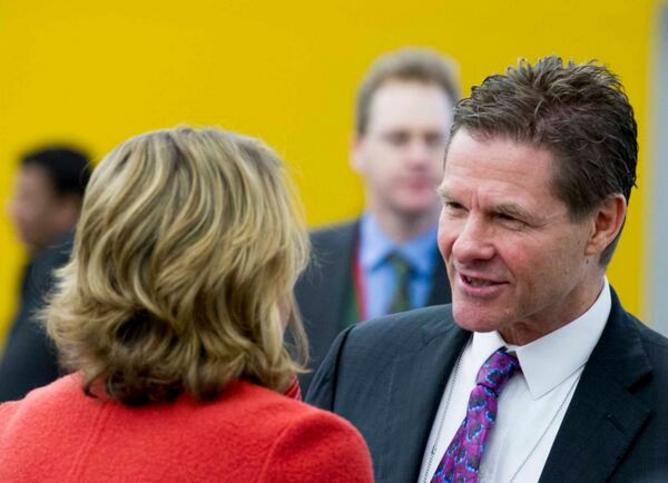
Australia has a new ambassador to lead its negotiations for the December 2015 United Nations climate change conference in Paris, which is tasked with hammering out an international agreement for post-2020.
Not that the appointment of senior diplomat Peter Woolcott has been exactly shouted by the government. It was announced by Foreign Minister Julie Bishop in a press release early Saturday morning, the deadest news time.
And climate is only part of Woolcott’s role, though it will dominate over the coming year. His title is Ambassador for the Environment. On the climate side he takes over the responsibilities of the former Ambassador for Climate Change, Justin Lee.
Once chief of staff to then-foreign minister Alexander Downer, Woolcott has most recently been Australia’s Ambassador to the United Nations in Geneva and to the Conference on Disarmament. In Foreign Affairs circles there was earlier speculation he might be sent to Jakarta as ambassador.
In his new post Woolcott will be based in Canberra but travel a good deal, including to Lima for the December meeting that is a stepping stone on the way to Paris.
Australia’s run up to the Paris meeting is in dramatic contrast to its approach to the 2009 Copenhagen summit. Back then, prime minister Kevin Rudd thrust himself into the centre of the action, one of the “friends of the chair”, spending his nights beforehand ringing around the world to lobby leaders.
At the conference itself, where he ran himself ragged, things worked out badly, leading to his unfortunate observation (in what was supposed to be an off-the-record comment) that “those Chinese fuckers are trying to rat-fuck us”.
This time the challenges for Australia will be different and the language – the delegation in Paris will be headed by Foreign Minister Julie Bishop – a good deal better.
Australia has gone from putting itself forward for a leadership role to being very much a follower on the international climate stage. It won’t be twisting arms, but trying to avoid its own arm being twisted.
But it will not be able to avoid international scrutiny. The government is officially signed up to the view that humans significantly contribute to climate change, that the world needs to avoid two degrees warming above pre-industrial levels, and that Australia will deliver a 5% cut in emissions on 2000 levels by 2020 (via its minimalist, domestically focused direct action policy).
In addition, Australia retains the role it has held since the Howard era of chair of the “umbrella” negotiating bloc that includes the United States, Canada, Japan and Russia.
When it comes to the post 2020 targets that countries will put forward ahead of Paris, Bishop has indicated Australia wants a show-me-yours-before-we-show-you-ours approach.
Tony Abbott’s recent speech in praise of coal is wildly out of sync with the sentiments of the just-released “synthesis” report from the Intergovernmental Panel on Climate Change (IPCC).
The IPCC says that to keep global warming in check, fossil fuel power generation needs to be almost entirely phased out by 2100, unless emissions are captured and stored. Abbott recently said that “coal has a big future as well as a big past”, and was essential for the world’s prosperity (and ours).
Launching the report, United Nations Secretary-General Ban Ki-moon said he had been urging pension funds and insurance companies to reduce their investments in coal and the fossil fuel economy.
Abbott, as part of a concerted government attack, has condemned as “stupid” the Australian National University’s decision to drop its investments (on the basis of environmental, social and governance ratings) in seven resource companies. Ministers described the decision as “reckless” and “bizarre”. Treasurer Joe Hockey said ANU was “removed from the reality of what is helping to drive the Australian economy and create more employment”.
Environment Minister Greg Hunt, questioned on Monday about the IPCC report, responded by pointing to the need to “clean up existing power stations. What we’re proposing right now is to work with power stations.” He highlighted research by the CSIRO “which is talking about a 30-50% reduction in emissions from brown coal power stations”.
It was later put to him that the CSIRO had said the key technology wouldn’t be available for some years – so what were power companies meant to do in the meantime?
“It’s up to each sector to find what works for them,” he said.
“We’ve always talked about a medium term for this technology because that’s the advice that the CSIRO has given and I am delighted that they are not just continuing this work, but becoming more confident in it.”
The climate report will feed into the current negotiations between the government and Labor over the government’s desire to cut back the renewable energy target (RET).
As the international debate talks down fossil fuel and talks up renewable energy, the pressure will on Labor not to give away too much in these negotiations. On the one hand, Labor wants to reach an agreement with the Coalition that will give investor certainty; on the other, it will be politically risky for it to cede a lot of ground on the popular RET.
In ways that are not yet clear, the international climate debate over the next 12 months will feed into the Australian domestic battle on a number of fronts.
![]()
Source: The Conversation. Reproduced with permission.








